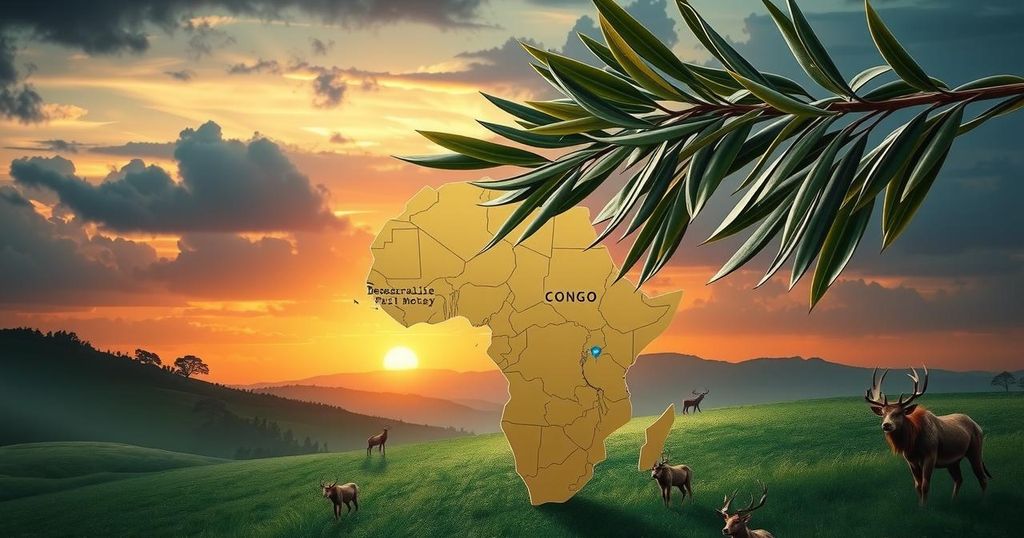Fighting continues between the M23 rebels and the DRC army, escalating international concern. Over 300 people have been injured, and 400,000 displaced amid humanitarian crises in Goma. Nine South African soldiers were killed in recent clashes. The African Union and European Union are urging a ceasefire and international support for those affected. Allegations of Rwandan involvement further complicate the conflict. The M23’s resurgence threatens regional stability, exacerbating an unfolding humanitarian disaster.
Fighting in eastern Democratic Republic of Congo (DRC) has intensified between the March 23 Movement (M23) and the DRC army, raising significant international alarm. The clashes erupted on multiple fronts in Masisi territory, close to Goma, North Kivu’s provincial capital, which is home to numerous international organizations. The M23 has threatened to seize Goma following aggressive engagements with the army and its allied militias, known as “wazalendo.”
The United Nations stabilization mission (Monusco) alongside the Southern African Development Community (SADC) peacekeeping forces is attempting to thwart the M23’s advances. Recently, the M23, allied with Rwandan forces, captured Minova, effectively severing supply routes to Goma. Clémentine de Montjoye of Human Rights Watch emphasized the urgent need for governments to press warring parties for the protection of civilians amidst horrific abuses.
Injuries from the conflict have surpassed 300 this week, and Goma faces a dire humanitarian crisis, with reports of severe shortages of drinking water and electricity. Approximately 400,000 individuals have been displaced due to recent hostilities, adding to the already staggering total of over four million displaced persons in the region.
The South African military reported that nine soldiers were killed in clashes with the M23 this week, alongside injuries to several others, while additional casualties occurred among Malawian and Uruguayan soldiers in the peacekeeping missions. In light of escalating violence, Monusco announced a temporary relocation of non-essential staff to ensure their safety, though humanitarian operations will persist.
International alarm has reached new heights, prompting calls for an immediate ceasefire. African Union Chairman Moussa Faki Mahamat urged the international community to provide support to those affected by the war’s collateral damage. The European Union condemned the M23’s actions as a violation of the ceasefire and urged Rwanda to cease its support for the rebel group.
Rwanda denies involvement with the M23, although the UN has confirmed such collaboration. Conversely, Rwanda and M23 have accused the Congolese army of cooperating with the Democratic Forces for the Liberation of Rwanda (FDLR). The M23 resumed its operations in November 2021, capturing territory and positioning itself near Goma, previously occupied in 2012. The ongoing conflict, which has persisted for over two decades, remains unresolved despite the presence of Monusco.
The conflict in eastern DRC has persisted for years, marked by a violent struggle between various rebel groups and the national army. The M23, a particularly aggressive rebel group, has re-emerged since November 2021, threatening strategic locations such as Goma, the provincial capital. This area has been a focal point for humanitarian crises due to continuous warfare, with millions displaced, prompting international organizations to intervene and provide humanitarian aid. The allegations of foreign involvement, notably from Rwanda, complicate the dynamics, contributing to a volatile situation that threatens regional stability.
The situation in eastern DRC remains critical, with ongoing clashes between the M23 and the DRC army threatening civilian safety and exacerbating an already dire humanitarian crisis. International calls for an urgent ceasefire and increased aid to affected populations underscore the global concern surrounding the conflict. Reports of casualties among peacekeeping forces add to the complexity of the crisis, highlighting the difficulties faced in maintaining stability and protecting vulnerable communities in the region.
Original Source: efe.com






